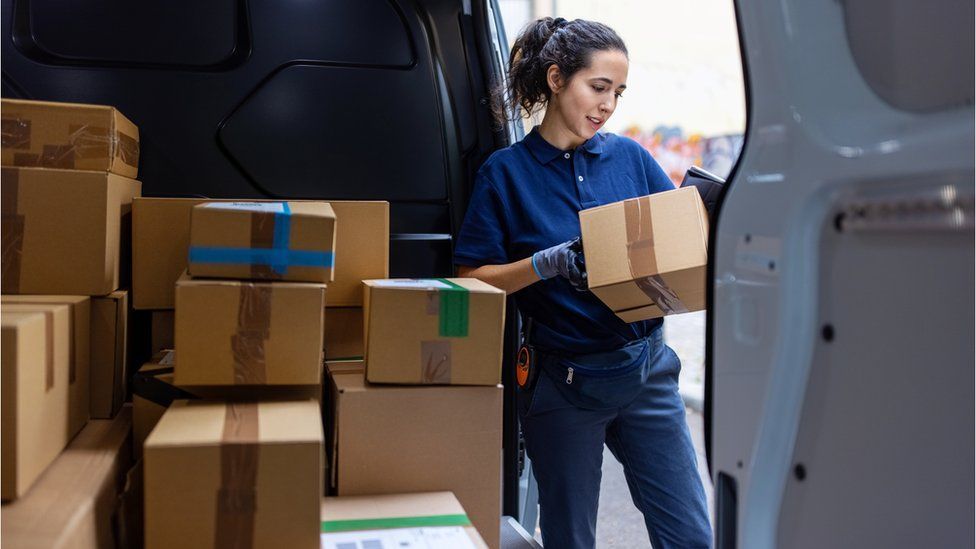
'I’ll buy five items and only keep one of them'
While other people do dry January, Susie Ramroop normally practises "dry spending" at the start of the year, and makes sure she doesn't make any unnecessary purchases.
But during the UK's third lockdown, the leadership coach says that boredom has prompted her to relax that rule.
"I'll surf the John Lewis website like other people surf the news," she says.
"This week I took five big packages back to Royal Mail, then I came home and there were more parcels. I took back dresses, a skirt, four tops and a pair of shoes. If I'm not paying for postage I might as well."
Stuck between two dress sizes, and an avid clothes shopper, Susie knows she "creates a returns problem" every time she orders. And she is far from unusual.

Thanks to the lockdown, UK online sales rose by more than a third in 2020, the highest growth since 2007, according to online retail body IMRG.
One problem with this for retailers is that customers are far more likely to return items when they buy them online. This is especially the case for items of clothing, which obviously cannot be tried on first.
A quarter of all fashion goods bought online in 2019 were sent back, according to one report. For in-store purchases that figure is less than 10%.
And online return rates have soared further during the pandemic, according to market research group Mintel. It found that 38% of all UK online shoppers said that the Covid-19 outbreak "had made them more confident in returning online purchases".
"The legacy from Covid is higher return rates," says Nick Carroll, Mintel's associate director of retail research.
He says that younger shoppers were already happy to "buy, try, return", but during the pandemic this has also become learned behaviour for older customers. Mintel's study also found that almost half (49%) of UK online shoppers had sent something back in the past year, rising to 60% for those aged 16-34.
This trend has caused headaches for online retailers, who often pay to cover the cost of delivery and return, and have to find a way to get the item back into their supply chain.
Shoppers can hold on to goods for weeks, or even months, before sending them back, by which time the resale value may have plummeted, meaning goods sometimes end up in landfill.
Teacher Naomi Hodge had to buy maternity clothes online during the pandemic, but found the sizes "completely impossible to guess".
"I'm not normally the kind of person who would buy multiple sizes and then send lots back," she says. "But I was getting very uncomfortable in the clothes I had, and needed something that fitted.

To solve problems like these, a number of tech firms are trying to make the returns process as slick and environmentally friendly as possible.
Rebound Returns, which manages about 40 million returns transactions a year, saw its global volumes shoot up by 63% during the pandemic.
The UK firm looks after the online returns process for clothing retailers like Asos, Boden and Gymshark, and asks customers to fill in their details online every time they request a return.
Rebound Returns - who shoppers will not be aware of, as it operates within the retailers' websites - flags up when a return is coming, meaning that the retailer can process the refund quickly and get the stock turned around.
The firms can also use this data to compare what their customers buy with what they send back, meaning they can target shoppers with correctly sized items.
"Brands are asking us how to target the right product to the right person, and improve the returns experience," says Rebound Returns chief executive Graham Best. "Consumers want choice, but they don't want every choice in the world. They want intelligent choice and that creates loyalty."
Rebound Returns also adds up the carbon footprint of its supply chain and passes that on to the retailer, so they can give customers the chance to make "sustainable choices" at the checkout, such as a slower delivery time, or the chance to make a charity donation.
This idea holds strong appeal for Steph Naylor, a data privacy manager from Woking, Surrey.

"A couple of years ago I used to do so much online shopping, to the point where I got two or three parcels every other day. Now I'll actively try not to choose next-day delivery. I'm not going anywhere, and I don't mind if it takes longer to reach me.
"It would be great to see on the checkout page when you make that choice between next day or longer delivery what the carbon footprint is of those options, " she says.
"If you could see the environmental impact, people would make more responsible choices. It would definitely make a big difference to me."
Swedish start-up Returnado, which manages the returns on behalf of clothing brands such as Musto and Helly Hansen, has taken a slightly different approach to boosting sustainability.

Customers are asked to upload a photo of the item they are returning so brands can assess the product's condition, and work out whether it should be returned, partially refunded, repaired, or if it can be disposed of locally.
Shoppers are also offered alternative items based on what they've bought previously, which leads to about 30% of returns being turned into exchanges, the company says.
Haider Abdo founded Returnado after spotting the mismatch between the ease of buying things online, and the difficulty of returning them.
"This doesn't just have an impact on the number of unreturned goods being sat on by consumers, but also their sentiment towards the brand and the likelihood of items ending up in landfill," he says.











